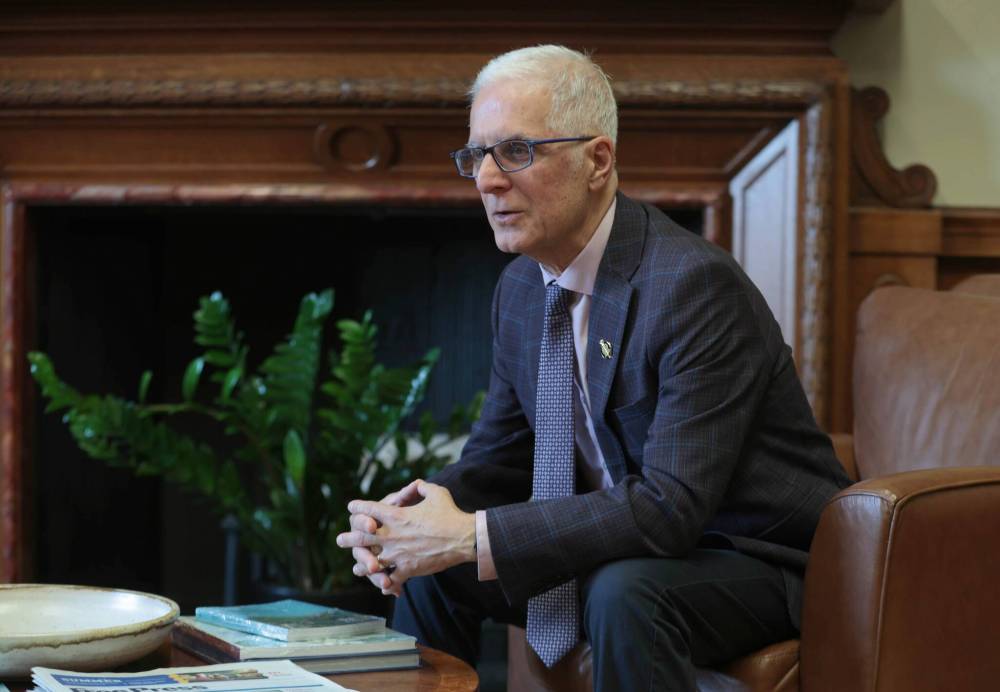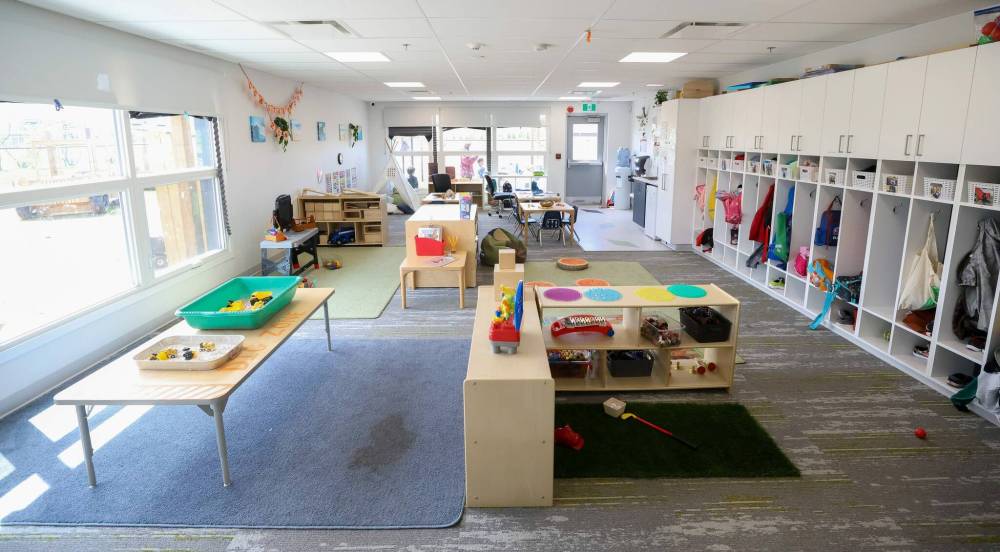Manitoba’s minister in charge of child care has his hands full.
His government has to create spaces, boost wages and find more early childhood educators.
In the wake of a Free Press investigation that put the spotlight on the province’s struggling child-care system, Nello Altomare, minister of early childhood learning, sat down with the newspaper to address a number of issues flagged in the six-part series published in June.
“I don’t want parents to experience what I experienced 25 years ago,” said Altomare, explaining his own struggles to obtain child care as a young parent.
“It took us a while to find it and we’re capable people. We were lucky to find care. I don’t want people to be lucky to find care. We’ve got work to do, so let’s get to work. That’s why we were elected.”
Anyone who has tried to secure a child care spot understands how difficult it is, especially for children under the age of six.
Of the more than a dozen directors the Free Press spoke to, all said they were wrestling with waiting lists for preschool and infant care that were at least 100 families long, with a majority having well over 300 names. Some were as high as 700.

Ruth Bonneville / Free Press
Nello Altomare, early childhood learning minister, says his government is committed to addressing the many challenges in child care: staffing, salaries and spaces.
The challenge to get a space worsened after the previous Conservative government introduced $10-a-day care for infants, preschool and nursery-school spaces in non-profit centres and child-care homes that receive provincial operating grants in 2023.
If a family put their name on any list for a licensed pre-school space, directors said it would take years to get in. The Manitoba Child Care Association recommends families put their name on a waiting list at least two years before their preferred enrolment.
“As a cabinet minister, I have influence, so when I talk to my cabinet colleagues, I often talk about the importance of child care, and ensuring full participation in the workforce,” Altomare said. “Typically, you were looking at single moms. We’re looking at people with precarious child-care arrangements. We need to deal with this.”
Complicating matters is the fact there is no firm data when it comes to how many families are waiting for a spot. That’s because the provincewide list was eliminated before the reduction to $10-a-day parent fees, replaced by the Manitoba Child Care Search tool in 2021, which requires families to connect with licensed facilities directly.
“We were lucky to find care. I don’t want people to be lucky to find care. We’ve got work to do, so let’s get to work. That’s why we were elected.”–Nello Altomare
Altomare acknowledged that waitlists are too long, but he said there are too many other items that need to be addressed first.
“Our focus right now is that we have enough trained people, so that we can open up spaces,” Altomare said. “That is a priority, don’t get me wrong, but we have ones that are even higher up the list that we need to tackle first.”
When Manitoba signed the early learning agreement with the federal government in August 2021, in which Ottawa committed $1.2 billion over the next five years, it came with the promise to create 23,000 new full-time regulated spaces by March 2026.
When asked how much of the province’s own money was being spent annually on child care, not including the federal investment, Altomare wasn’t able to provide a concrete figure.
While it was the Conservatives that promised to create the 23,000 spaces, it’s now a promise the NDP, which won the election last October, has adopted.
Altomare pointed to various province-backed projects that will increase spaces, including the Ready-to-Move project. It allocates funds towards building new regulated non-profit infant and preschool spaces in higher-need communities. As of July 2023, Manitoba, using both provincial and federal money, has committed $120 million, which covers two phases of the project — with more planned — and 1,970 new spaces in 25 rural and First Nations communities.
Policy also ensures child care be included in the construction of any new schools, Manitoba Housing developments or provincial facilities.
As of March, the province had created just 2,700 new spaces for children aged 0-6, a pace well-short of reaching the goal of 23,000. A provincial spokesperson said they’re on track to create 5,800 more for that age group, plus more than 4,400 school-age spaces.
Most of those commitments will be completed by March 2025, Altomare said, which will still leave the province several thousand spaces shy of the overall goal.
“We’re committed to creating spaces to Manitobans. Whatever that number ends up being, right now people are demanding space,” Altomare said. “We have to have strategies in place to not only train people but build these spaces so that they’re accessible to Manitobans.”
Studies have shown the sector is short 1,000 early-childhood educators to reach the number of trained staff required by the province.
Fewer of them work today than in 2017, as per the most recent Manitoba Education and Early Childhood Learning annual report, from 2022-23, dropping to 2,805 from 3,070 in that time.
In a 2023 report titled The Big Short: Expansion of Early Childhood Education in Post-Pandemic Canada, University of Toronto researchers looked at the demand for early childhood educators as the country eased out of the COVID-19 pandemic.
They examined each province’s promise to increase licensed spaces and then figured out how long it would take, in years, to train enough early-childhood educators graduates to fill those new spots. For Manitoba, which produces on average 140 new graduates annually, it would take 18 years to meet the mark.
“It seems daunting,” Altomare said. “For us, it’s a challenge.”
Altomare agreed low wages are the biggest impediment to retaining current staff and recruiting new people.
The latest provincial wage grid, which took effect July 1, shows a 2.75 per cent increase for front-line staff, with a child-care assistant starting at $17.51 an hour (Manitoba’s minimum wage is $15.30), a level 2 early child educator with two-plus years’ experience earns $22.79 an hour and a level 3 educator brings in $24.31 an hour.
For directors with a level 3 who are in charge of 150 to 200 spaces — the highest-ranked position — the starting wage is $36.81 an hour, with a “target” mark only slightly higher at $37.85. The target rate is what the province encourages facilities to eventually reach, or exceed, depending on their budget.
“Right now, I’m not satisfied with the wages. I’ll be honest with you,” Altomare said.

MIKE DEAL / FREE PRESS
The province points to ready-to-move daycare projects, such as Bright Beginnings Educare in Headingley, as a way to add desperately needed spaces to the system.
The minister recalled his time as a teacher and principal in the River East Transcona School Division, where he used to poach educational assistants by offering them more money. As leader of Manitoba’s school system, he hopes to level the playing field.
The minister couldn’t promise another pay increase, but said it’s something he’ll continue to advocate for in cabinet meetings. Increasing the wages will not only attract new employees, he said but will also prompt the return of many who have left.
“We have to close that gap, I know that…. We have to ensure that we’re competitive when it comes to working things. We’re offering pension and benefits now to (early childhood educators), whereas before that wasn’t happening. So, when we talk about closing the gap, it’s more than just about wages, it’s also about all the benefits people rightly deserve when they work in a sector like child care.”
Another pressing issue for licensed child care centres, which account for more than 90 per cent of spaces in the province, is the one-size-fits-all approach to funding. The model doesn’t take into consideration factors such as the variance in operating costs between centres.
For example, those attached to a school might pay a minimal fee, around $100 a month, or get their space for free. Other facilities can spend thousands of dollars a month for a commercial site.
Until the NDP government provided a two per cent boost shortly after it was elected last fall, centres had had their operating grants frozen since 2016. The NDP government increased grants by another five per cent this spring.
Prior to the boost, the government’s funding formula worked out to $295 per daycare space. It’s now $354, a 20 per cent increase.
Directors say the boost still isn’t enough because it didn’t match inflation over the years. After all, the increase is based on the frozen 2016 figures.
“That’s something that’s going to happen down the road,” the minister said. “We have to come up with a funding model that’s really reflective of what the challenges are in the system.”
He said the formula must consider different needs in regions such as rural and northern areas.
The Free Press spoke to several directors in northern communities who said many of the issues that exist in the city are magnified north of the 54th parallel and much harder to remedy, assuming they can be fixed at all.
Trying to find reliable staff, let alone trained employees has become a major burden. Lengthy waitlists, while not as long when compared to Winnipeg facilities, are also a significant concern.
The minister said there has to be creative solutions.
“This is a calling. People love working with kids, so let’s find a way to keep them working with kids,” the minister said.
“Let’s find a way through either pension, benefits, wages, obviously, but working conditions. In the north, it’s really important…people like working in their community. So, let’s find a way to support them in their communities.”
By the time he leaves office, he wants Manitobans to be proud of licensed child care, and it starts will building and maintaining a strong relationship with the biggest stakeholders.
“My message to them is that you now have a partner,” he said. “I have extensive experience working with child-care centres. I also think I’m pretty good at the cabinet table, at really advocating for the sector and I’m going to continue in that important role.”
Jeff.Hamilton@freepress.mb.ca
X: @jeffkhamilton

Jeff Hamilton
Multimedia producer
Jeff Hamilton is a sports and investigative reporter. Jeff joined the Free Press newsroom in April 2015, and has been covering the local sports scene since graduating from Carleton University’s journalism program in 2012. Read more about Jeff.
Every piece of reporting Jeff produces is reviewed by an editing team before it is posted online or published in print — part of the Free Press‘s tradition, since 1872, of producing reliable independent journalism. Read more about Free Press’s history and mandate, and learn how our newsroom operates.
Our newsroom depends on a growing audience of readers to power our journalism. If you are not a paid reader, please consider becoming a subscriber.
Our newsroom depends on its audience of readers to power our journalism. Thank you for your support.